Achievements and Announcements
ACHIEVEMENTS
- UniSA researchers win $15m to address some of society’s biggest health challenges
- Trailblazing MBA program recognised by world’s largest business education alliance
- UniSA staff and alumni among distinguished Australia Day honourees
- Students to have greater opportunities for Indo-Pacific travel as UniSA secures $1m+ in funding
- ‘Dream come true’: Japan study tour enriches student's outlook
- Brain tumour scholarships awarded to UniSA students
ANNOUNCEMENTS
APPOINTMENTS
ACHIEVEMENTS
UniSA researchers win $15m to address some of society’s biggest health challenges
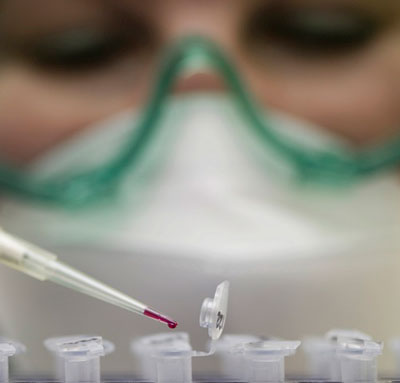
Research to find solutions to some of Australia’s biggest challenges in health feature in UniSA’s latest National Health and Medical Research Council (NHMRC) Investigator and Ideas research grants, collectively valued at almost $15 million.
The funds are part of the NHMRC’s research grants for projects commencing in 2024.
Investigator Grants provide the highest-performing researchers at all career stages with consolidated funding for their salary (if required) and a significant research support package.
NHMRC Investigator Grants
The UniSA Investigator Grant recipients are:
Professor Elina Hyppönen ($2.9 million): Transforming nutritional epidemiology research: A fresh look on diet and brain health.
“Nutrition is a challenging area of research, and too often we hear advice that can come across as contradictory,” Prof Hyppönen says. “This is because evidence for the role of diet on health commonly relies on observational studies, as randomised controlled trials are not always feasible for ethical or other reasons. My approach combines methods from epidemiology, statistical genetics, and machine learning, and in the next five years I will aim to bring together different approaches to strengthen the evidence for the role of diet on health.”
Professor Gillian Caughey ($2.37 million): Harnessing real-world data to drive high quality care for Australia’s aged care population.
“The Aged Care Royal Commission recommended urgent action to improve the quality and safety of care for our older population receiving aged care,” Prof Caughey says. “My research aims to inform the best ways to provide high-quality, person-centred care using a national aged care and health care data platform, the Registry of Senior Australians.
Professor Natasha Harvey ($1.6 million): Defining the genetic and developmental basis of human lymphatic vascular disease.
“Lymphatic vessels play crucial roles in development and disease by controlling tissue fluid balance, directing immune cell traffic and absorbing dietary lipids,” Prof Harvey says. “The goal of this application is to define the genes and developmental events underlying lymphatic disorders so that new therapeutic agents for the treatment of these complex disorders can be developed.”
Dr Janette Kazenwadel ($662,000): Characterising haemogenic endothelial cell potential in the lymphatic vasculature.
“We made a groundbreaking discovery that cells lining lymphatic vessels also have the capacity to produce blood cells,” Dr Kazenwadel says. “My research will translate this game-changing finding to define how and when lymphatic vessels produce blood. This may prove valuable in situations of anaemia, infection, immunity and potentially cancer.”
NHMRC Ideas Grants
The objective of the Ideas Grant scheme is to support innovative research projects addressing a specific question(s).
The UniSA Ideas Grant recipients are:
Dr Gokhan Cildir ($822,458): Elucidating the function of a novel regulator of IgE-mediated mast cell activation and chronic spontaneous urticaria development.
Chronic spontaneous urticaria (CSU) is a common skin disease caused by the uncontrolled activation of tissue-resident mast cells. Genetic factors underlying CSU are unknown.
“We identified a novel genetic association between an uncharacterised gene and CSU, and revealed this gene to be a critical regulator of immunoglobulin E (IgE)-mediated mast cell activation,” Cr Cildir says.
“In this project, we will seek to explain its role in mast cells to better understand and treat CSU and angioedema.”
Dr Tessa Gargett ($1.14 million): Micro-targeting IL-2 delivery to remodel the glioblastoma microenvironment.
The diagnosis of a brain tumour is devastating for the patient, their family and their doctors because these aggressive tumours have limited treatment options and extremely poor survival rates, with the worst types being universally fatal.
“Fortunately, we are in the midst of a technological revolution when it comes to medical science. This project will take the very latest developments in cell and gene therapy and apply them to the challenge of treating brain cancer,” Dr Gargett says.
Professor Hannah Keage ($1.22 million): Predicting delirium vulnerability from pre-surgery neurophysiological measures.
Delirium is a sudden impairment in thinking skills, that comes and goes, and is common after surgery – affecting 25-30% of patients.
“Our study will identify patterns of brain activity associated with an increased delirium risk, which will ultimately improve care and enable prevention efforts to be targeted,” Prof Keage says.
Professor Leanne Dibbens ($1.37 million): Identifying new and personalised treatments for KCNT1 neurological disorders using pharmacogenetics.
KCNT1 mutations cause severe seizures and early death and there are currently no treatments.
“We identified four novel FDA approved drugs which inhibit the effects of three KCNT1 patient mutations,” Prof Dibbens says. “This project will investigate the ability of these four drugs to counteract effects of 24 different KCNT1 patient mutations in animal models.”
Dr Sophie Wiszniak ($724,147): Neural crest cells as modulators of Wnt signalling in heart development and congenital cardiac outflow tract defects.
Congenital heart defects are extremely common because of the complex nature of heart formation, and the multiple cell types involved.
Neural crest cells are a type of cell that contributes to the heart, yet their involvement in congenital heart defects may be under-appreciated.
“We will assess new roles for neural crest cells in modulating cell to cell signalling events to underpin correct heart development, as well as how these signalling mechanisms are disrupted to cause congenital heart defect,” Dr Wiszniak says.
Dr Guillermo Gomez ($2.12 million): Harnessing an unexpected new role of the CD47:SIRPA axis to target glioblastoma invasion.
This project will investigate how brain tumour cells reprogram to invade the surrounding healthy brain tissue and suppress immune activity.
“Our results will lay the foundations for new treatments for brain cancer that reduce tumour cell invasion and facilitate immunotherapy,” Dr Gomez says.
For further details see the media release announcing the grants.
Trailblazing MBA program recognised by world’s largest business education alliance
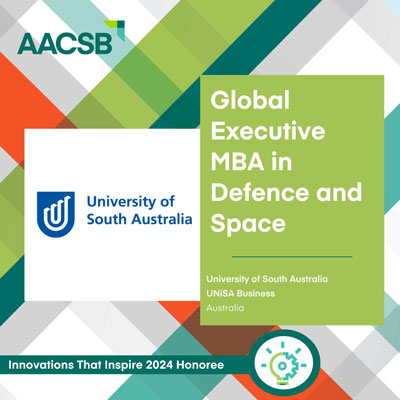
A new program launched by UniSA to address critical skills gaps in defence and space and help build a pipeline of talent for the AUKUS (Australia-United Kingdom-United States) strategic alliance has been recognised by the world’s largest business education alliance.
The Global Executive MBA in Defence and Space (GEMBA), the first program of its kind in Australia, has been named as one of the 26 renowned institutions by the Association to Advance Collegiate Schools of Business (AACSB) International’s Innovations That Inspire spotlight program.
The annual initiative recognises global institutions that are innovating to create relevant, equitable and impactful business education.
It is the second time in a row that UniSA has been listed in the Innovations That Inspire program. In 2023, UniSA’s partnership with global professional services company Accenture to create an online Bachelor of Digital Business, providing high-level business and digital skills, was recognised by the AACSB.
UniSA Business Executive Dean Professor Andrew Beer says the strategic importance of the GEMBA cannot be understated.
"This is the overwhelming view of industry and government who identify workforce capabilities as one of the key challenges in meeting the anticipated economic and social demands associated with AUKUS," he says.
In 2024, Innovations That Inspire features business schools that are leveraging innovation to drive new value for the communities they serve.
AACSB president and CEO Lily Bi says Innovations That Inspire names institutions that are “leading boldy” to enable equitable access, empower problem-solvers, design timely curricula and credentials, deploy adaptive learning methods, create new knowledge, and develop societal impact leaders.
“In a world facing social, economic and technological challenges, business schools are innovating to develop powerful solutions,” she says. “The 2024 Innovations That Inspire selections exemplify the unique ways that business schools create value and impact for their stakeholders.”
UniSA is working on the Global Executive MBA in Defence and Space with the University of Exeter (UK) and Carnegie Mellon University (USA) to deliver the 18-month program across the three countries, reflecting the trilateral AUKUS alliance.
The first hand-picked cohort of UniSA students from the trailblazing program began the MBA in September 2023.
Over the course of the program, students will undertake three in-country residential study programs in Adelaide, Washington, DC, and London, UK.
UniSA staff and alumni among distinguished Australia Day honourees
Members of the UniSA community have been recognised for their outstanding service and contributions to various industries in this year’s Australia Day Honours.
Former UniSA Pro Vice Chancellor, the late Emeritus Professor Robin King, was made an Officer of the Order of Australia (AO) for his distinguished service to engineering, tertiary education and professional organisations through executive roles.
Former Associate Professor and Head of the South Australian School of Art, William Max Lyle, was awarded a Medal of the Order of Australia (OAM) for his service to the creative arts as a sculptor.
Numerous alumni were also recognised.
The full list of UniSA staff and alumni who were recognised in the 2024 Australia Day Honours is available on the UniSA Alumni website.
Students to have greater opportunities for Indo-Pacific travel as UniSA secures $1m+ in funding
More students are set to reap the benefits of cross-cultural learning thanks to the University of South Australia being awarded almost AUD $700,000 in 2024 New Colombo Plan (NCP) Mobility Program grants.
The latest funding adds to the existing pool of active NCP scholarships, which totals more than $1 million.
The funding will help provide 165 undergraduate students across the University’s seven academic units the opportunity to undertake study, language training and internships in the booming Indo-Pacific region.
Students can select from a range of countries to further their learning, including South Korea, Japan, Indonesia and Kiribati.
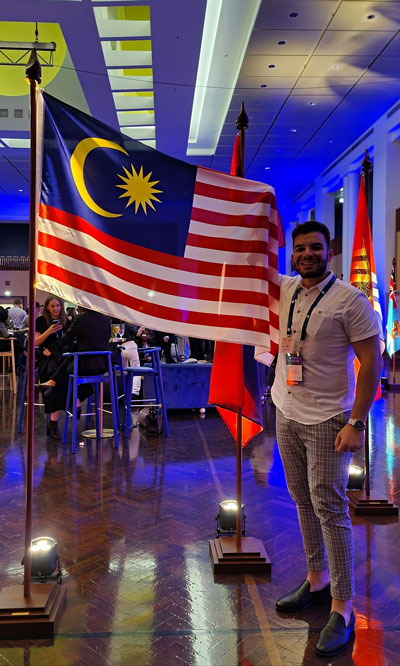 Peter Akiki at the 2022 New Colombo Plan (NCP) National Summit in Canberra.
Peter Akiki at the 2022 New Colombo Plan (NCP) National Summit in Canberra.Adelaide-based engineering consultant and Bachelor of Engineering (Honours) (Civil) graduate Peter Akiki is a former UniSA NCP grant recipient.
He has recently been appointed as one of the two NCP Alumni Ambassadors for South Australia.
He says his experience participating in a virtual NCP project in Malaysia in 2021, which saw him exploring the expansion of heritage buildings for Common Ground, a co-working space provider in Southeast Asia, was invaluable to his engineering career.
“I am excited to contribute to fostering international partnerships and enhancing educational opportunities and look forward to engaging with UniSA students and staff alike,” Peter says.
For UniSA, the NCP program has contributed significantly to the return of students pursuing studies abroad post-pandemic, with participation at nearly 70% pre-COVID levels in 2023.
Established in 2014, the NCP program plays a pivotal role in creating influential and diverse relationships in the Indo-Pacific through deepening Australia’s ties to universities, businesses and institutions within the region.
‘Dream come true’: Japan study tour enriches student's outlook
One UniSA student has had his “dream come true” after being selected for the Mitsui Educational Foundation (MEF) Japan study tour.
Bachelor of Psychology (Honours) student Luke Male, 24, was among only eight students across Australia in 2023, who had the opportunity to explore Japan through the unique program, learning about the vibrant nation’s history, business practices and rich cultural traditions.
The fully funded trip, having run for more than four decades, has seen nearly 400 Australian students visit Japan, giving them insight into the two countries’ bilateral relations.
Participants listened to an address from the Australian Ambassador to Japan, sat in on an international politics class at Tokyo’s Keio University and interacted with successful Japanese graduates hired at Mitsui, one of the world’s most diversified trading, investment and service enterprises.
As the only student from South Australia to be chosen, Luke says each experience he had during the trip left an “indelible mark” on his understanding of the world.
“Observing how companies tackled the challenges of demanding work culture in Japan offered valuable insights into the intersection of psychology and business,” he says.
Luke says the chance to visit his “dream destination”, which included cities such as Hakone and Chigasaki in the nation’s east and Hiroshima and Miyajima in the west, has also helped grow his professional and personal networks.
“I expected to learn a lot about Japanese culture and business and to meet people who could help provide me with new opportunities,” he says.
“What I didn’t expect was to absolutely fall in love with the country, the people, and the customs.”
Launched in 1971, the MEF sponsors eight Australian students from 22 partner universities to partake in a three-week immersive study tour each year.
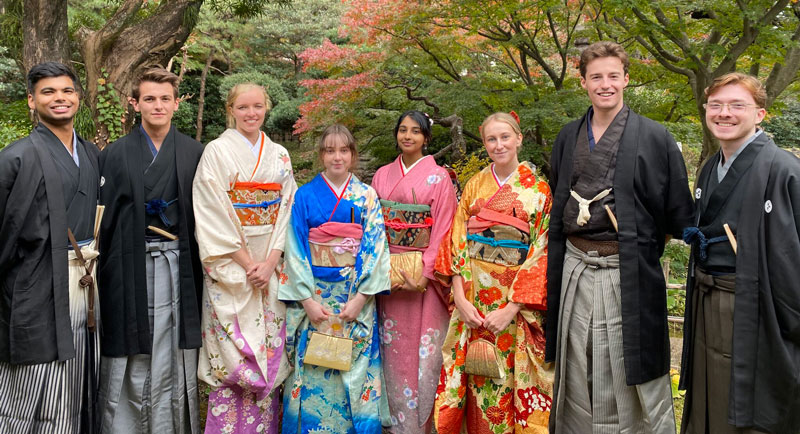
Brain tumour scholarships awarded to UniSA students
UniSA research centres and students have benefited from the latest round of grants and scholarships awarded by the NeuroSurgical Research Foundation (NRF), which funds research into the cause, diagnosis, prevention and treatment of disease, injuries or malfunction of the brain, spine and nerves.
The NRF’s final round of 2023 grants took annual donations for UniSA’s Centre for Cancer Biology (CCB) to more than $1 million and helped to attract federal funding of $32 million.
CCB Head of the Molecular Therapeutics Laboratory, UniSA Research Professor Stuart Pitson, says the NRF’s support is helping the brain cancer research community continue its strong growth by providing seed funding for students and early career researchers, and facilitating additional high-impact grants.
“These scholarships and awards not only contribute to better patient outcomes, but also celebrate the lives and ongoing impact of the award namesakes,” Prof Pitson says.
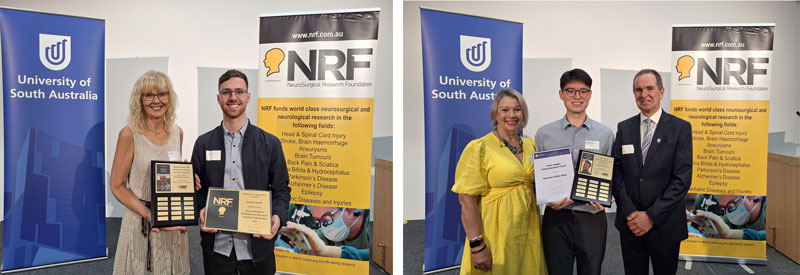 (L) Kerry Buttery and scholarship recipient Samual Wallis. (R) Cherrie Adams, Eunwoo (Chris) Nam and Martin Adams.
(L) Kerry Buttery and scholarship recipient Samual Wallis. (R) Cherrie Adams, Eunwoo (Chris) Nam and Martin Adams.The Richard Buttery NRF Glioblastoma Research Vacation Scholarship, presented in February, enabled recipient Samuel Wallis to explore potential careers in glioblastoma research through an eight-week UniSA placement.
The Chris Adams Uni SA Research Grant was awarded to UniSA PhD candidate Eunwoo (Chris) Nam, enabling him to present his research overseas, where he will gain feedback and information to bring back to the CCB’s research community. The grant was established in 2015 in memory of Chris Adams, who died at the age of 26 as a result of brain cancer.
Visit the NRF website to see the full list of recipients.
ANNOUNCEMENTS
Finding the right script to reduce medication errors in hospital

Pharmacists will partner with patients and doctors in a new national project to reduce patient medication errors that frequently occur during hospital stays.
By bringing pharmacists into the fold to collaborate with doctors and patients on an electronic medication and prescription model, the project team expects to see a marked reduction in the number of medication errors being made in hospitals.
The $1.4 million Federal Government-funded project will be led by Dr Jacinta Johnson, a UniSA pharmacist, who is also responsible for driving research development across SA public hospital pharmacies.
Dr Johnson says the aim of the project is to improve the quality of care for people aged 65 years and older, who experience three times as many medication errors during hospital stays than younger patients.
“Medication errors are the most frequent and preventable mistakes being made in hospitals today,” Dr Johnson says.
“Across Australia, research shows two medication errors are made on admission to hospital for every three patients, and an error occurs 1 in 10 times a medication is administered. Most of these affect older patients, who are at much higher risk.”
The CARe-MED study will implement and evaluate a patient-centred, partnered medication charting and deprescribing model in hospitals using electronic medical records.
This work will build on a range of paper-based pharmacist charting models that have been evaluated in Australia, demonstrating significant reductions in medication errors (from 66% to 3.6%), cutting average hospital stays by 10% and reducing the cost per admission by $726.
Read more in the media release.
APPOINTMENTS
New University Council members appointed

Commercial lawyer and business coach Carolyn Mitchell is one of four new members of UniSA’s governing council in 2024.
Mitchell has acted as a lawyer for major national and multi-national corporations, achieving settlements and resolving matters in highly complex situations. A former managing partner at law firm Cowell Clarke, Mitchell now works primarily as a professional non-executive director and business coach. She’s chair on a range of company boards including Credit Union SA Ltd, Haigh’s Chocolates and Netball SA.
Other new University Council members for 2024 include academic staff elected member to Council, Dean of Programs (Science, Construction and Project Management) Professor Craig Williams. The two new student elected members are Social Work student and 2024 USASA president Oliver Shephard-Bayly and Master of Communication student and 2024 USASA postgraduate student Benjamin Opiyo.
Announcing the new appointments, University Chancellor and Chair of the UniSA Council Pauline Carr says the new members bring a broad range of experiences, knowledge and expertise to University Council.
“I welcome all the new members of Council, including staff and student elected members, who will bring skills, expertise and insights from a range of backgrounds as we work together to ensure the University of South Australia continues to be the best it can be in 2024 and beyond,” Carr says.
The new appointees began their terms on 1 January 2024 and replace Council members whose terms ended on 31 December 2023: Jim Whalley AO (Executive Director and co-founder of Nova Group), Dr Kit MacFarlane (2023 academic staff elected member), Isaac Solomon (2023 USASA President, student elected member) and Riya Kaur Bhaizada (2023 USASA postgraduate student elected member).
Reappointed members include professional staff representative, Students and Research Registrar Vanessa Matthews; as well as Michael Abbott AO KC and Bill Muirhead AO.
Other continuing Council members include Professor David Lloyd, John Hill, Jim Hazel, Mary Patetsos AM, Nicolle Rantanen-Reynolds, Ian Smith AM and Academic Board Presiding Officer Professor Deirdre Tedmanson.
Other Stories
- Invasive weed could be turned into a viable economic crop
- Discovery could lead to new RNA-therapeutics for many cancers
- Parents behaving badly: the impact on kids’ sport
- Can kimchi really help you lose weight? Hold your pickle. The evidence isn’t looking great
- From the Vice Chancellor: A question of culture
- Achievements and Announcements
- Immersive exhibition invites visitors to help mend a broken world
- Innovative urban living concept tackles housing woes and offers socially connected solutions
- Afghan refugees ‘transform and rejuvenate’ Port Adelaide LGA
- The latest books from UniSA researchers



